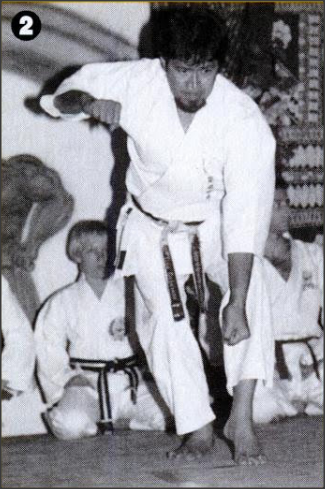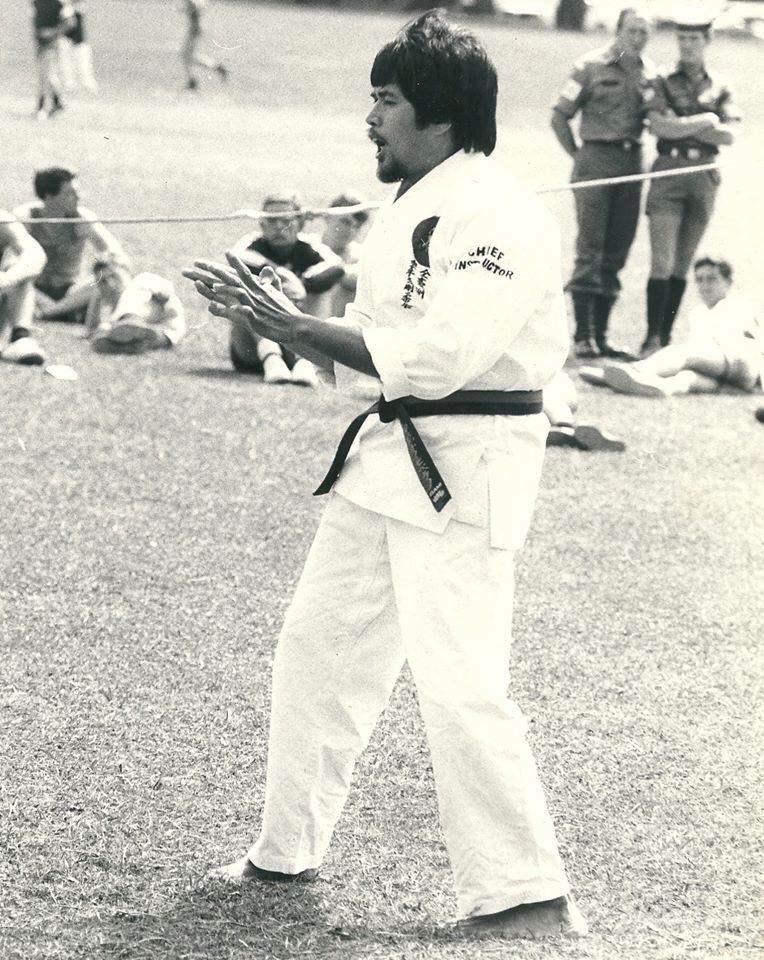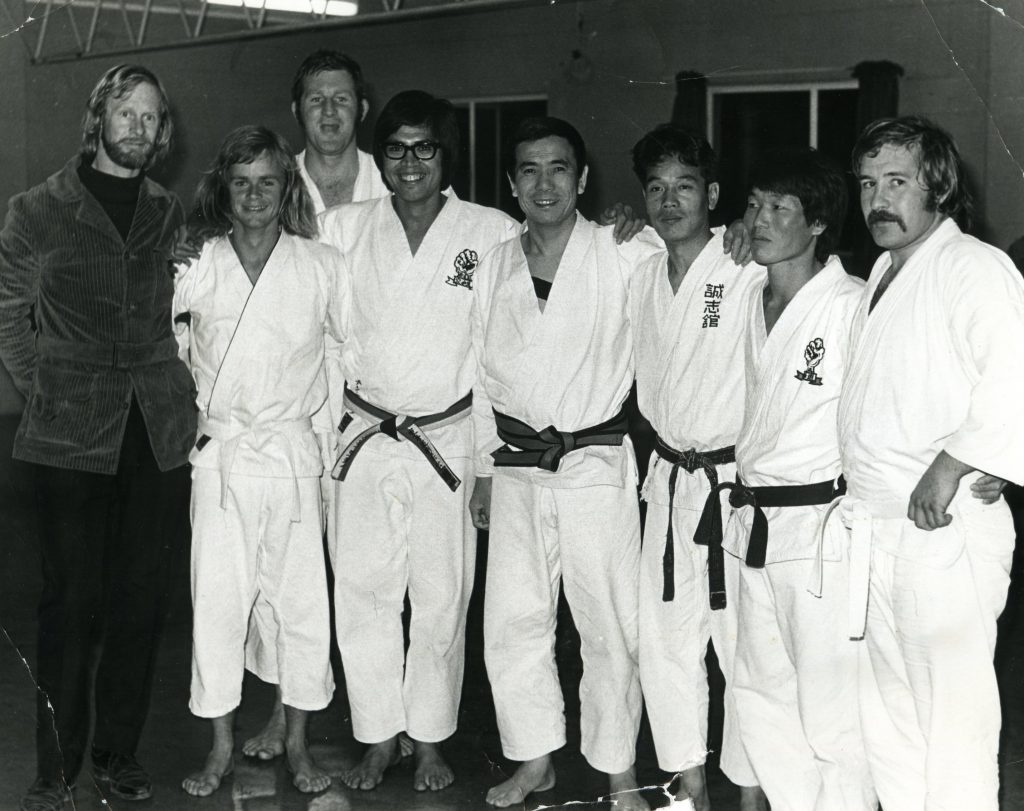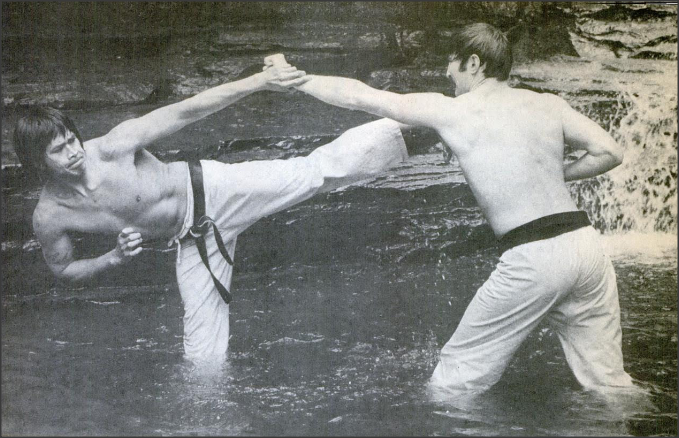 In 1966, Tino Ceberano arrived in Melbourne when relocating from Hawaii with his family of two children and saw entry to a country of hardly what one would call fanfare however the location would soon prove well for establishing his martial arts career.
In 1966, Tino Ceberano arrived in Melbourne when relocating from Hawaii with his family of two children and saw entry to a country of hardly what one would call fanfare however the location would soon prove well for establishing his martial arts career.
On the third day of arriving in Melbourne, the 6th Of November 1966, his first invitation to the Croydon Judo School of Sensei David Jenkins was a godsend for this young martial artist. He was a guest in this small dojo invited by circumstance of an acquaintance of the family who was a member of this humble dojo in the foot hills of the Dandenongs in Melbourne.
The turning point was that a chain reaction of dojos (of all Melbourne’s Judo schools from the Judo Association) invited Tino to demonstrate his skills and before long they employed him as a resident teacher on given days as scheduled on a vast rotation to the entire region of Melbourne, the outer suburbs as well as dojos in Geelong and Flinders in the south and inland to Echuca in Northern Victoria.
At the beginning of this era Tino saw only a dribble of other martial arts but he was always looking for others that may have been taught in the region so he could link up with their activities or perhaps form an alliance.
In those days there was a Jujitsu and Karate club called “Silver Top Taxi Club” one of Australia’s first full-time dojos as well as the Apollo Gym, home of ‘The Mighty Apollo’ (Paul Anderson known strong man of the time who dragged trams up Burke Street with his teeth and had a vehicle drive over his body). These had been some of the only known practitioners of the time in Melbourne.
In the interest of the acknowledgments to those of the Silver Top Taxi group Tino mentions the names of Senseis Ivan Barry (kyokushin–kai karate), Ivan Zavetchanos (Judo), Billy Brain, Eddie Amin (kyokushin–kai karate) and Jack Rozinsky (taekwondo).
Twelve months passed when Tino was informed that a Shorinryu karate dojo under Sensei Barry Packenham had opened in Ballarat.
Of course amongst the Chinese in China Town, the occasional word got around of those who trained in silence and reserving only to the Chinese as noted to the practice of that era.
In this period of time Tino Ceberano became a show pony to the many Judoka and their dojos as the early years of the mid sixties to early 70’s progressively developed with the oncoming of the Bruce Lee Era and many dojo start ups began with the surge of the martial arts in mass production.
As well as the Judo dojo’s that Tino was training with were also the Karate dojos. Amongst these dojos were the clubs of Wally Maclean and Johnny Watkins both of whom later on became the propagators of the Wado Kai in Australia.
 In 1967 Tino took the first summer training camp in a lodge at the Falls Creek resort. In those days it was of course his Marine training that created the ordeal of what he believed had been at the time, unprecedented, as the young only just endured .
In 1967 Tino took the first summer training camp in a lodge at the Falls Creek resort. In those days it was of course his Marine training that created the ordeal of what he believed had been at the time, unprecedented, as the young only just endured .
He was in his heyday and running was his forte as with the many physical jerks you would imagine. They would never finish the day off without having to have done the hundreds of push ups, sit ups, squats and hours of basics.
Their training started as early as 5am and finished at no earlier than 10pm in the evening. They had a full week of that ordeal.
These camps continued from that year on to the late eighties where Tino’s camps and others who followed since set the stage of training with a serious pursuit of endurance, indoctrination of the arts in the traditional sense and putting the physical practice to merge with the mental ordeal as in ‘mind over matter’.
In 1967 Tino also undertook the challenge of opening his first dojo in Melbourne independently and distinctly different from the local Judo teaching dojos.
It was such a challenge for himself having to endure the unforeseen circumstances of being on his lonesome. He fought as a foreigner possessed even while he spoke the language because of the demand put on him from all angles. There had to be the expected challenges and this was noted by many. The Sharpies & the Skin Heads were a growing breed and the dojos filtered the many tryers.
In 1968 Tino was undergoing studies as a Physical Education Instructor and this got him well into the Education Department’s interest of having Martial Arts in the schools. His first engagement was the Wattle Park High School which he will never forget as a launching pad for his future endeavours. Education to the youth of tomorrow became an ideal for Tino and he reached for answers why his calling as an instructor was imminent. It was as if a mission in life had disguised his real role.
 It was also in this year that he started the competition circuit from within his schools to create a means of public display in what was the martial artist’s dream of competing to test one’s skill against another and enjoy the relationship in personal attributes.
It was also in this year that he started the competition circuit from within his schools to create a means of public display in what was the martial artist’s dream of competing to test one’s skill against another and enjoy the relationship in personal attributes.
The very first ever recorded proper competition that was ever created was at the opening of the Aboriginal Advancement League’s Centre in Fitzroy.
It was in honour of the famous prominent Politician Sir Edgar Nichols who later became one of South Australia’s Premiers. From that event came the beginnings of the Box Hill tournament that saw the old boys of the Goju Kai from that era best each other with the best of spirit and skills that made Tino proud to this day of what transpired to greater things as the years went on.
In 1968 a visit by the 1st World Olympic Champion of Judo from Japan, Sensei Isao Inokuma, accompanied by the great teacher and most respected foreign exponent of the Japanese Martial Arts (he was dan graded to more than 5 different arts in Japan) Sensei Don Draeger.
It was complimented by the Judo Union of which was headed by Sensei Ivan Zavetchanos of Brunswick. A special line up of all the Judo Greats from most of Australia was taken by Inokuma Sensei to an easy ippon win of all his opponents at that very memorable event held at the Monash University.
The many events since followed with great instructors arriving to these parts from everywhere and this only meant a healthy development of the local Martial Arts scene.
Tino remembers the likes of Kato Shigeru Sensei from Kyokushin Kai, the arrival of Sensei Paul Gurreliot of the Shotokai, the return of Sensei Ke Hyung No of the Taekwondo who prior to that was the training instructor at the Silver Top Taxi in Judo.
Later in time was the man with his famous nunchaku Sensei Masayuki Takasaka, and another great name of the Kyokushin Kai Sensei Takumi Higashitani, Sifu Bill Cheung, Bill Lau, Rocky Kwong, Barry Pang, David Pederson, and Pier Tsui Po and others from the Kung Fu lineage.
Tino has not mentioned all of the following instructors who have since made the honour roll of who’s who in the arts from these parts. Unforgotten are those of the Judo and Juijitsu group also, Master Komp Sensei, Master Bradshaw Sensei, and those that had been around from the early days.

In 1969 the Japanese Navy visited Melbourne with a team of Karateka’s ranging from the 3rd Dan ranks to their instructor Sensei Masami Tanaka of the Shotokan as a 5th Dan. In Tino’s humble dojo the Maling Road Goju-Kai Training Centre, they hosted these members – a total of 20.
His students were all brown belts at the time, amongst them Bob Jones, Richard Norton, Mike Costello, Max Fabris, Jim Riddle, Albert Lau ,Warren Ross, Jim Karakostas, Bernie Fraser, and many more were there to train with the foreign guests.
It was an evening to remember, not only did they conquer them in Kumite but a good drink down at the Pub for the old Aussie hospitality of having a technicolor swill. Tino had his time cut out with each and every one of the Japanese 4th Dan visitors taking him on in a fight to the finish. He took on the Japanese twenty, one at a time, as they gave him all they could.
Tino is proud to say that he was able to defeat all that took him on, a moment that he will never forget for the rest of his life. That of course was only a good friendly match, one that they would not forget as he recalls having to meet a couple of them back in Japan some years later on one of his trips.
In 1970 after his return to Melbourne regaining his footing after an extended stay in Japan living with the famous Grand Master of renown – Gogen Yamaguchi, the Goju remnants of what became a historical change and perhaps the first ever visit to the State by a Grand Master, saw the famous ‘Cat man in action’. The venue was Albert Park Basketball Stadium.
The line of people entering to see a legend began from the very door of the Albert Park Stadium to near the Queens Road highway. There was never since a standing show of how supportive the many spectators to a Martial Arts display paying honour to such a great humble and truly Master of the Arts – Gogen Yamaguchi Hanshi.
Tino’s initial feeling of pride was overwhelming. He saw the people of Victoria pay honour and revered attention in awe of a man who was the legend of the time. The demonstrations, the display of remarkable skills in truly traditional Goju Ryu techniques, and the manner of which this entire night presented sat craved in the audience’s memory of the visit of the ‘Cat man – Gogen Yamaguchi Hanshi’.
The beginning of the Federation of Australian Karatedo Organisation (later the Australian Karate Federation AKF) created what had been until this day, a direct drive to the society’s interest of Martial Arts in organisational order. Tino was the very instigator to this FAKO; he brought the elements together at his cost with just about all of the practitioners involved in the Japanese style practice from all of Australia.
The venue was a humble restaurant in Bondi, New South Wales. The interim President was unanimously appointed because of his expertise and leadership in this area of organisational gathering and intentions to development. His name Mr Donald Cameron, MP of Queensland in the years to come becoming the Deputy Whip in the Federal Parliament of Canberra.
These beginnings saw development of major changes of progressive and positive expansion in the martial arts.